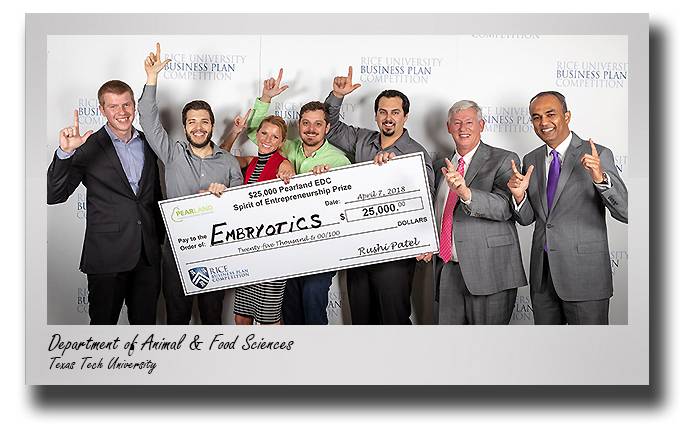Embryotics Startup Brings Non-Invasive Reproductive Technology to Livestock Industry
By: Suzanna Cisneros
A sister-brother team, Cara and Steve Wessels, gained attention by winning a national competition similar to Shark Tank with a new company that could change the livestock industry. Cara began her undergraduate at Texas Tech University in the Department of Animal and Food Sciences with the hopes of becoming a veterinarian. She worked with the Howard Hughes Medical Institute and discovered a new passion – research.
"As an undergrad, I really enjoyed working on my research project, and I did not want to leave it behind," Cara said. "I made the decision to begin my Ph.D. and work with Dr. Prien at the TTUHSC lab. That research would build up to what we are working on now with noninvasive embryotic selection technologies for livestock."
Sam Prien, a professor in the Texas Tech University Health Sciences Center Department
of Ob/Gyn, has a joint appointment as a professor in the Texas Tech's Department of
Animal and Food Sciences. As part of its assisted reproductive technology program,
Prien works with TTUHSC's physicians and reproductive endocrinologist in the treatment
of infertility patients. As an expert in the field of reproductive physiology and
technologies, he became a mentor to Cara.
Cara graduated last summer from TTU with her Ph.D. On a flight, she met Kimberly Gramm, managing director of the TTU Innovation Hub, and the two talked about Cara's research work. "Kimberly said you need to commercialize this," Cara said. "I didn't take her too seriously at the time, but after we kept talking I realized it was something we could commercialize. "
Gramm told Cara about the National Science Foundation (NSF) Innovation Corps (I-Corps) Program. The NSF I-Corps program prepares scientists to extend their focus beyond the research lab and assists projects that are ready to move toward commercialization. Graham introduced Cara to Robert Rangel, now the CEO of Embryotics, and the three started an I-Corps program team.
"The cohort was out of Atlanta, and we were given $50,000 to travel all over the country to perform customer discoveries," Cara said. "We did 231 interviews in a 6-week time period, which is the most ever done with this program. After that we had a better idea of a product market fit and using that information were able to build a business plan and worked on making projections to understand our customer market."
Cara partnered with her brother Steve, an economic graduate student. The two come from different fields, which would help lead to their success of their startup company, Embryotics, which improves pregnancy rates from assisted reproductive technologies in livestock species and human fertility.
"Cara is the science side of the project, and I am the business side," Steve said. "Before this undertaking, I had never taken a college-level biology class. Now I know more about embryotic selection technology than I could have imagined. My role was to help Cara commercialize her Ph.D. product."
Steve's business plan first starts with the cattle industry. "The cattle industry is huge," Steve said. "One million embryos are transferred into the U.S. annually. We estimated the value to cattle producers at $60 per embryo for embryos that were evaluated to have higher pregnancy success rates. From our research, we found this can turn out to be a $60 million market for our product just in cattle alone."
Steve said the product can be used for any mammalian species. Other products on the market are extremely invasive and have a lot of other drawbacks for the animals.
"Cattle producers have informed us that they haven't had any technologies that really boosted their pregnancy rates in over a decade, and they would adopt a new technology if it offered just a one percent improvement," Cara said. "This offers the ability to select the best embryos to transfer, which in return should boost ranchers' livestock pregnancy rates and getting it out there with a price they can afford. This really has the potential to make remarkable impact to the livestock industry."
Cara and Steve also signed up for the Rice Business Plan Competition, which is the world's richest and largest graduate-level student startup competition hosted by the Rice Alliance for Technology and Entrepreneurship. This year, 42 teams from around the world competed for more than $1.5 million in cash and prizes. Cara and Steve's Embryotics placed eighth overall and received a $25,000 check.
Prien said he is incredibly proud of Cara's accomplishments. "Cara is yet another example of the quality people I have had the pleasure of working with over the years through my associating with the Department of Animal and Food Sciences, the College of Agricultural Sciences and Natural Resources and the Honors College on the academic campus."
Embryotics also did well at a recent TTU Innovation Hub Spark iLaunch Business Plan Competition. Cara and Steve placed first and won $10,000. A past Shark Tank winner was one of the judges. Embryotics also received the People's Choice award in the competition, increasing its total winnings to $11,000. Cara hopes to launch the product in the fall and will use the prize money to fund development and create inventory.
"Our story is crazy," Cara said. "TTUHSC, the Department of Animal and Food Sciences and the TTU Innovation Hub came together to make an unlikely team, but the bottom line is – it was a really great team that fell into the right place at the right time."
Editor's Note: For more information, contact the Office of Communications and Marketing in the Department of External Relations at Texas Tech University Health Sciences Center at (806) 743-2143 or here
Discoveries
-
Address
Texas Tech University, 2500 Broadway, Box 41075 Lubbock, TX 79409 -
Phone
806.742.3905 -
Email
vpr.communications@ttu.edu
